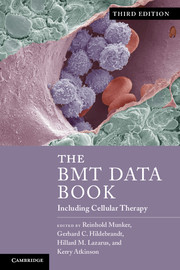Book contents
- Frontmatter
- Contents
- List of contributors
- Foreword
- Preface
- Acknowledgments
- Section 1 Basic science
- Section 2 Hematologic malignancies
- 3 Therapeutic decision making in BMT/SCT for acute myeloid leukemia
- 4 Therapeutic decision making in BMT/SCT for acute lymphoblastic leukemia
- 5 Therapeutic decision making in BMT/SCT for chronic myeloid leukemia and other myeloproliferative syndromes
- 6 Therapeutic decision making in BMT/SCT for chronic lymphatic leukemia
- 7 Therapeutic decision making in BMT/SCT for myelodysplasia
- 8 Hematopoietic cell transplantation for non-Hodgkin lymphoma
- 9 Therapeutic decision making in BMT/SCT for Hodgkin lymphoma
- 10 Therapeutic decision making in hematopoietic SCT for multiple myeloma
- 11 Therapeutic decision making in SCT for amyloidosis
- Section 3 Solid tumors
- Section 4 Nonmalignant disorders
- Section 5 Cellular therapy
- Section 6 Practical aspects and procedures
- Section 7 Complications
- Section 8 The BMT/SCT pharmacopoeia
- Section 9 HLA-testing and laboratory medicine
- Appendix Guide to the internet and literature databases relevant for BMT/SCT
- Index
- References
7 - Therapeutic decision making in BMT/SCT for myelodysplasia
Published online by Cambridge University Press: 05 August 2013
- Frontmatter
- Contents
- List of contributors
- Foreword
- Preface
- Acknowledgments
- Section 1 Basic science
- Section 2 Hematologic malignancies
- 3 Therapeutic decision making in BMT/SCT for acute myeloid leukemia
- 4 Therapeutic decision making in BMT/SCT for acute lymphoblastic leukemia
- 5 Therapeutic decision making in BMT/SCT for chronic myeloid leukemia and other myeloproliferative syndromes
- 6 Therapeutic decision making in BMT/SCT for chronic lymphatic leukemia
- 7 Therapeutic decision making in BMT/SCT for myelodysplasia
- 8 Hematopoietic cell transplantation for non-Hodgkin lymphoma
- 9 Therapeutic decision making in BMT/SCT for Hodgkin lymphoma
- 10 Therapeutic decision making in hematopoietic SCT for multiple myeloma
- 11 Therapeutic decision making in SCT for amyloidosis
- Section 3 Solid tumors
- Section 4 Nonmalignant disorders
- Section 5 Cellular therapy
- Section 6 Practical aspects and procedures
- Section 7 Complications
- Section 8 The BMT/SCT pharmacopoeia
- Section 9 HLA-testing and laboratory medicine
- Appendix Guide to the internet and literature databases relevant for BMT/SCT
- Index
- References
Summary
MDS constitutes a group of clonal hematopoietic stem cell disorders occurring often in the elderly that are characterized by cytopenias and cytogenetic abnormalities, and can evolve into AML. The prevalence and incidence of MDS have increased in the last 20 years, likely as a result of increasing longevity of the population. These disorders are heterogeneous and staged and classified according to the percentage of blasts in the bone marrow, cytogenetic abnormalities, and number of cytopenias. As shown on pages 78–79, several staging systems are available. The International Prognostic Scoring System (IPSS) will divide cases of MDS into groups according to survival and risk for leukemia transformation. The disadvantage of this scoring system is that it does not take into account age, ferritin, transfusion dependence, and marrow fibrosis. There are other scoring systems like the WHO Prognostic Scoring System for OS and relapse. A revised scoring system is currently under development (Appelbaum et al., 2011).
- Type
- Chapter
- Information
- The BMT Data BookIncluding Cellular Therapy, pp. 77 - 89Publisher: Cambridge University PressPrint publication year: 2013



